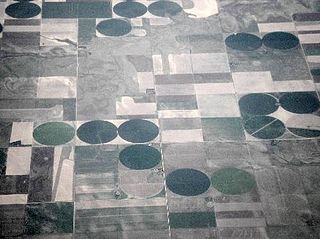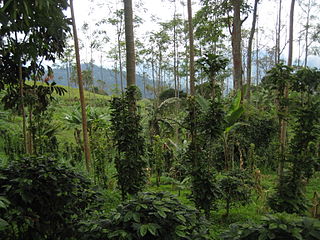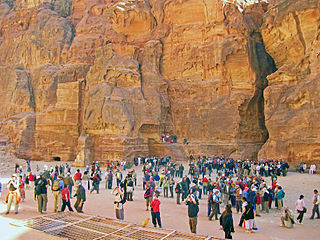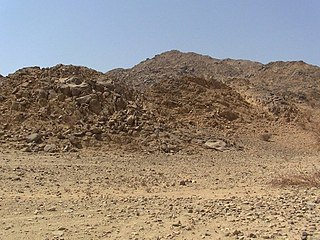Related Research Articles

Desertification is a type of land degradation in drylands in which biological productivity is lost due to natural processes or induced by human activities whereby fertile areas become increasingly arid. It is the spread of arid areas caused by a variety of factors, such as climate change and overexploitation of soil as a result of human activity.

In ecology, an oasis is a fertile area of a desert or semi-desert environment that sustains plant life and provides habitat for animals. Surface water may be present, or water may only be accessible from wells or underground channels created by humans. In geography, an oasis may be a current or past rest stop on a transportation route, or less-than-verdant location that nonetheless provides access to underground water through deep wells created and maintained by humans.

A farm is an area of land that is devoted primarily to agricultural processes with the primary objective of producing food and other crops; it is the basic facility in food production. The name is used for specialized units such as arable farms, vegetable farms, fruit farms, dairy, pig and poultry farms, and land used for the production of natural fiber, biofuel and other commodities. It includes ranches, feedlots, orchards, plantations and estates, smallholdings and hobby farms, and includes the farmhouse and agricultural buildings as well as the land. In modern times the term has been extended so as to include such industrial operations as wind farms and fish farms, both of which can operate on land or sea.

Permaculture is an approach to land management and settlement design that adopts arrangements observed in flourishing natural ecosystems. It includes a set of design principles derived using whole-systems thinking. It applies these principles in fields such as regenerative agriculture, town planning, rewilding, and community resilience. Permaculture originally came from "permanent agriculture", but was later adjusted to mean "permanent culture", incorporating social aspects. The term was coined in 1978 by Bill Mollison and David Holmgren, who formulated the concept in opposition to modern industrialized methods instead adopting a more traditional or "natural" approach to agriculture.

Masanobu Fukuoka was a Japanese farmer and philosopher celebrated for his natural farming and re-vegetation of desertified lands. He was a proponent of no-till, herbicide and pesticide free cultivation methods from which he created a particular method of agriculture, commonly referred to as "natural farming" or "do-nothing farming".

Forest gardening is a low-maintenance, sustainable, plant-based food production and agroforestry system based on woodland ecosystems, incorporating fruit and nut trees, shrubs, herbs, vines and perennial vegetables which have yields directly useful to humans. Making use of companion planting, these can be intermixed to grow in a succession of layers to build a woodland habitat. Forest gardening is a prehistoric method of securing food in tropical areas. In the 1980s, Robert Hart coined the term "forest gardening" after adapting the principles and applying them to temperate climates.

Sustainable agriculture is farming in sustainable ways meeting society's present food and textile needs, without compromising the ability for current or future generations to meet their needs. It can be based on an understanding of ecosystem services. There are many methods to increase the sustainability of agriculture. When developing agriculture within sustainable food systems, it is important to develop flexible business process and farming practices. Agriculture has an enormous environmental footprint, playing a significant role in causing climate change, water scarcity, water pollution, land degradation, deforestation and other processes; it is simultaneously causing environmental changes and being impacted by these changes. Sustainable agriculture consists of environment friendly methods of farming that allow the production of crops or livestock without damage to human or natural systems. It involves preventing adverse effects to soil, water, biodiversity, surrounding or downstream resources—as well as to those working or living on the farm or in neighboring areas. Elements of sustainable agriculture can include permaculture, agroforestry, mixed farming, multiple cropping, and crop rotation.

Wadi Rum, known also as the Valley of the Moon, is a valley cut into the sandstone and granite rock in southern Jordan, near the border to Saudi Arabia and about 60 km (37 mi) to the east of the city of Aqaba. With an area of 720 km2 (280 sq mi) it is the largest wadi in Jordan.

Geoff Lawton is a British-born Australian permaculture consultant, designer, teacher and speaker. Since 1995 he has specialised in permaculture education, design, implementation, system establishment, administration and community development.

Jordan is a sovereign Arab state in the Middle East. The capital, Amman, is Jordan's most populous city as well as the country's economic, political and cultural centre.

The Sahara Forest Project aims to provide fresh water, food and renewable energy in hot, arid regions as well as re-vegetating areas of uninhabited desert. The founding team was composed of Seawater Greenhouse Ltd, Exploration Architecture, Max Fordham Consulting Engineers and the Bellona Foundation.

Desert greening is the process of man-made reclamation of deserts for ecological reasons (biodiversity), farming and forestry, but also for reclamation of natural water systems and other ecological systems that support life. The term "desert greening" is intended to apply to both cold and hot arid and semi-arid deserts. It does not apply to ice capped or permafrost regions. Desert greening has the potential to help solve global water, energy, and food crises. It pertains to roughly 32 million square kilometres of land.

Brad Stewart Lancaster is an expert in the field of rainwater harvesting and water management. He is also a permaculture teacher, designer, consultant and co-founder of Desert Harvesters, a non-profit organization.

Natural farming, also referred to as "the Fukuoka Method", "the natural way of farming" or "do-nothing farming", is an ecological farming approach established by Masanobu Fukuoka (1913–2008). Fukuoka, a Japanese farmer and philosopher, introduced the term in his 1975 book The One-Straw Revolution. The title refers not to lack of effort, but to the avoidance of manufactured inputs and equipment. Natural farming is related to fertility farming, organic farming, sustainable agriculture, agroecology, agroforestry, ecoagriculture and permaculture, but should be distinguished from biodynamic agriculture.

Hügelkultur, literally mound bed or mound culture is a horticultural technique where a mound constructed from decaying wood debris and other compostable biomass plant materials is later planted as a raised bed. Adopted by permaculture advocates, it is suggested the technique helps to improve soil fertility, water retention, and soil warming, thus benefitting plants grown on or near such mounds.

Ecotourism in Jordan has grown tremendously due to environmental pressures and the demand for jobs outside of the cities, especially since the establishment of the Dana Biosphere in 1993, the first biosphere reserve.

Regenerative agriculture is a conservation and rehabilitation approach to food and farming systems. It focuses on topsoil regeneration, increasing biodiversity, improving the water cycle, enhancing ecosystem services, supporting biosequestration, increasing resilience to climate change, and strengthening the health and vitality of farm soil.

The Al Baydha Project, in rural, western Saudi Arabia, is a land restoration, poverty-alleviation, and heritage preservation program, based on principles of permacultural and hydrological design. Located roughly 50 km (31 mi) south of Mecca, in Makkah Province, Al Baydha is an area characterized by the rocky, arid, foothills of the Hijaz Mountains. Arab tribes are the major residents of this region.
Will Bonsall is an American author, seed saver and veganic farmer who lives in Maine. He is a regular speaker about seed saving, organic farming and veganic farming.
The Jordan Baja is an international baja-style rally raid cross-country endurance racing event held in the Wadi Rum desert, in Jordan. The event had the status of a World Cup Baja round in 2021 for both FIA and FIM championships. Jordan Baja had 559 competitive kilometres in a total route of 859 km for 2021 with 15 motorcycles and five quads in fray in the near-by deserts of Wadi Rum. Competitors from 15 nations took part in the fourth round of the FIA World Cup for Cross-Country Bajas, Round 2 of the FIM Bajas World Cup and a National Baja was also held along with the two international-status events.
References
- ↑ Kaushik (2014-04-20). "Organic Farming in the Deserts of Wadi Rum". Amusing Planet. Retrieved 2017-04-12.
- ↑ "Archived copy". Archived from the original on 2016-11-18. Retrieved 2016-11-18.
{{cite web}}: CS1 maint: archived copy as title (link) - ↑ "Letters from Jordan - On Consultation at Jordan's Largest Farm, and Contemplating Transition". Permaculturenews.org. 2010-08-06. Retrieved 2017-04-12.
- ↑ "Desert Food Forest and Organic Commercial Production in Three Years - Update on Wadi Rum Consultancy". Permaculturenews.org. 2013-12-10. Retrieved 2017-04-12.
- ↑ "Wadi Rum Bedouins Defy Nature by Growing Organic Veggies". Greenprophet.com. 12 December 2013. Retrieved 2017-04-12.
- ↑ "Organic Farming in the Deserts of Wadi Rum". Earthporm.com. 26 June 2014. Retrieved 2017-04-12.
- ↑ "Greening The Desert - Muslim Aid Australia permaculture". YouTube. 2015-06-01. Retrieved 2017-04-12.
- ↑ "From Desert to Oasis in 4 Years". Permaculturenews.org. 2014-02-01. Retrieved 2017-04-12.